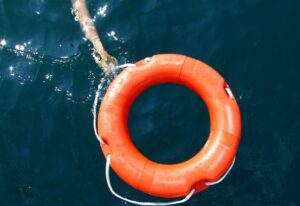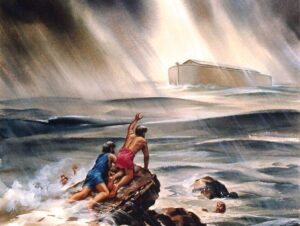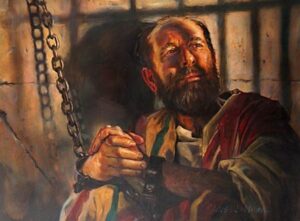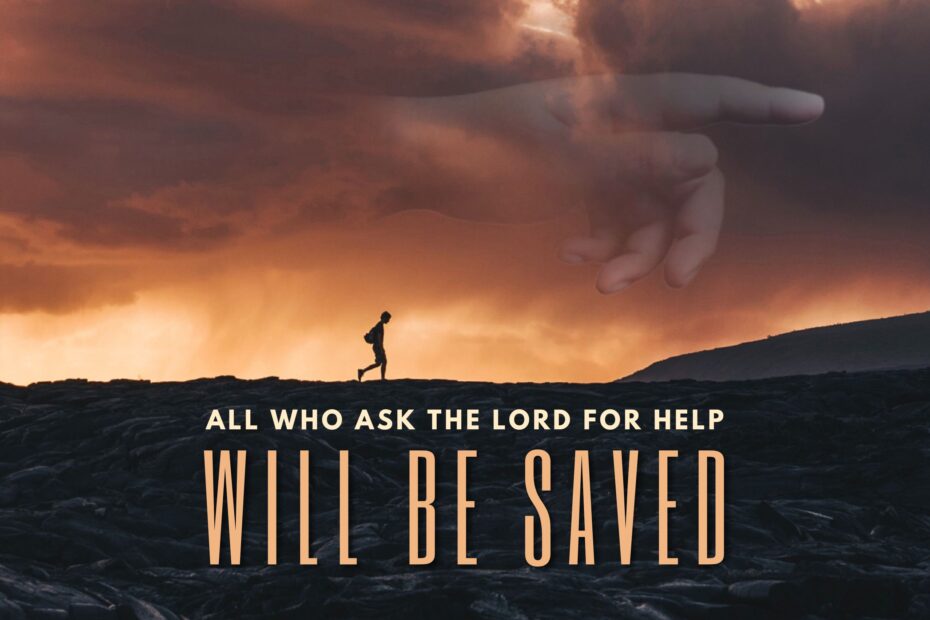Dear friends, in light of the natural disasters, wars, diseases, and other calamities becoming more and more pronounced all over the world, many people are coming to believe that these events are part of the Biblical prophecies mentioned by Jesus in Matthew 24. In Luke 21:26, Jesus mentions that the situation will become so worse that people will faint from fear as they wait for what is coming over the whole earth. Doubtless, many of those who are taking these prophecies seriously will have this lingering question in their minds, “Will I be saved?”

In the Old Testament, God speaks through the prophet Joel about the End of Age... "I will give warnings of that day in the sky and on the earth; there will be bloodshed, fire, and clouds of smoke. The sun will be darkened, and the moon will turn red as blood before the great and terrible day of the LORD comes.” (Joel 2:30-31). Please note, the description of events given here is almost on the same lines as what Jesus would describe later. God makes it very clear here also that the situation will go from bad to worse. And then he adds, “But all who ask the LORD for help will be saved..." (Joel 2:32).
All who ask the LORD for help will be saved. Those words sound very comforting but here is where many people can go wrong. They can get into the error of thinking that they will be saved if they keep on crying out as many times as possible, “Lord help me, please help me...” Or perhaps recite one of the 'most effective' prayers of help that has worked in the past, etc. But that will not work. Surely, even in Noah’s time, the people cried out to God for help when they realised they could do nothing to escape the flood. But they did not make it; only Noah and his family survived.

Now, from the story of Noah, we know that God not only warned him about the flood but also prepared him for it. And when the flood did come, He kept him and his family safe till it subsided. But here we need to pause and ask ourselves a few questions: Having been warned about the coming trouble, what was it that gave Noah the confidence that God would save him and his family? Why did he even go to the extent of building the ark at the cost of being ridiculed by everyone? What made him rely so much on God? Why did he go by every word that God spoke to him? The answer is simple. In the past, much before God announced to him about the flood, he faced many troubles in his life. But he would always turn to God for help; and each time, God would help him.
Another example of a person who received help from God, again and again, is David. When he wanted to fight against Goliath, everyone including King Saul had their doubts about him. But he said to them… “I have killed lions and bears, and I will do the same to this heathen Philistine, who has defied the army of the living God. The LORD has saved me from lions and bears; he will save me from this Philistine." (1 Samuel 17:36-37). Kindly note, he had fought not only with a lion but with a bear as well. And it was not one lion or one bear but many lions and many bears. He had to face them not once but many times. And each time, God saved him. He found God to be more reliable than anyone else. In one of his psalms, he writes… “In my trouble I called to the LORD; I called to my God for help. In His temple He heard my voice; He listened to my cry for help... This God—how perfect are His deeds! How dependable his words! He is like a shield for all who seek his protection. (Psalms 18:6, 30).

In all his troubles, David received help from God every time he called out to Him. That was what gave him the confidence to face Goliath, fight fierce battles, and even face the worst of troubles in his life. No trouble could trouble him. Again, he writes in one of his Psalms… 'I saw the Lord before me at all times; He is near me, and I will not be troubled. (Psalm 16:8-11). In fact, most of the Psalms written by David are about asking God for help and thanking Him for the help received.
St. Paul, even after encountering Christ, was no stranger to troubles. But like Noah, like David, and like many other men in the Bible, he had come to the conclusion that God alone is the answer to all his troubles – all help comes from Him. Let us give thanks to the God and Father of our Lord Jesus Christ, the merciful Father, the God from whom all help comes! He helps us in all our troubles. (2 Corinthians 1:3-4). Note the words, ‘all help’ and ‘all our troubles’. From these words, we can conclude that God helps us not just once but many times. He helps us not in the case of a few troubles but many troubles; not just small troubles but big troubles as well. Not just one type of trouble but all types of trouble. Provided we call to Him for help.
In light of what we have read so far, we can now say without a doubt that the big and small troubles in our lives are God-given opportunities for us to learn to rely on no one else but Him alone. St. Paul writes… We want to remind you, friends, of the trouble we had in the province of Asia. The burdens laid upon us were so great and so heavy that we gave up all hope of staying alive. We felt that the death sentence had been passed on us. But this happened so that we should rely, not on ourselves, but only on God, who raises the dead. (2 Corinthians 1:8-9). This means we need God’s help even after we die – to raise us from the dead.

Therefore, we who have always been turning to God for help and have been helped by Him each time have no reason to fear when the great trouble – trouble much greater than the flood at the time of Noah – comes upon the whole earth. On the contrary, like Paul, we must be able to testify and encourage others in the faith by saying to them… I know whom I have trusted. (2 Timothy 1:12). From such terrible dangers of death He saved us, and will save us; and we have placed our hope in Him that He will save us again. (2 Corinthians 1:10). We can say to them with conviction, “All who ask the LORD for help will be saved." (Joel 2:32).

